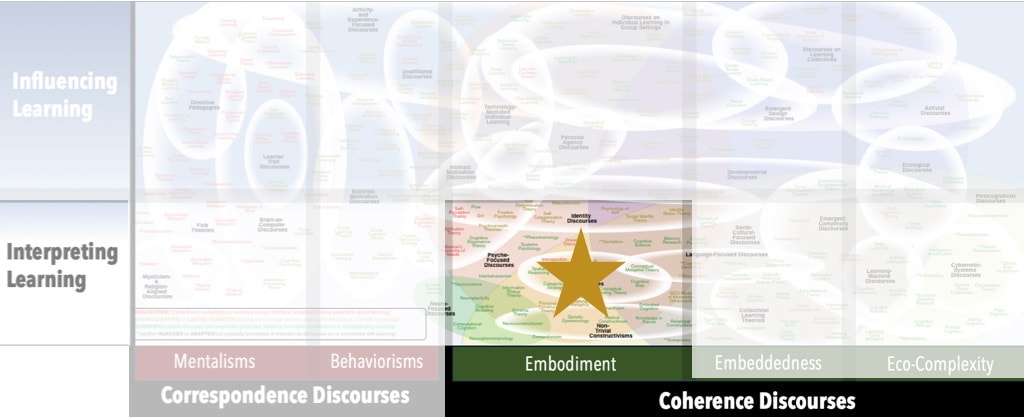Focus
How assumptions and beliefs give rise to understandingsPrincipal Metaphors
- Knowledge is … web of propositions (believed to mirror reality)
- Knowing is … acting according to one’s model
- Learner is … a knitter of propositions (individual)
- Learning is … deriving coherence among propositions
- Teaching is … disrupting (web of) propositions
Originated
1940sSynopsis
A “mental model” is a web of beliefs and/or truths that is assumed by a knower to mirror some aspect of reality. The model thus affords a confidence that the situation at hand is understood, and so the knower experiences it as a coherent and sufficient basis for acting and predicting – even though it might be logically flawed and/or empirically false. Associated constructs and discourses include:- Counterfactual Thinking – meaning literally “against the facts,” a type of unproveable speculation on how the present might be different if the past were changed. Types include:
- Downward Counterfactuals – speculations on how the effects of an event might have been worse. Downward Counterfactuals tend to be associated with feelings of being fortunate under the circumstances, and so they typically prompt more positive emotions.
- Upward Counterfactuals – speculations on how the effects of an event might have been better. upward Counterfactualstend to be associated with feelings of being unfortunate, and so they typically prompt more negative emotions. (That said, they can also support resolutions to do better in the future.)
- Mental Model Theory of Reasoning (Philip Johnson-Laird, Ruth Byrne, 1990s) – the perspective that one’s strategies and capacities for abstract reasoning are tethered to one’s mental models.
Commentary
Mental Model Theory shares core assumptions with a range of Non-Trivial Constructivisms – in particular, Schema Theory. However, with its narrow definition of “mental model” in terms of formal and explicit propositions (in contrast to the much broader conception of “schema,” which stretches across the totality of one’s experiences), Mental Model Theory tends to be much narrower in scope. Perhaps the biggest issue with the theory is the word “model” in its name, which might prompt readers to assume inappropriately that the theory is a version of Representationalism.Authors and/or Prominent Influences
Kenneth Craik; Jay Wright ForresterStatus as a Theory of Learning
Mental Model Theory is a perspective on learning that is especially useful for making sense of why humans sometimes fail to learn – that is, for offering an explanation of how established understandings can militate against the development of more expansive, robust, and powerful understandings.Status as a Theory of Teaching
Mental Model Theory offers no direct advice to teachers, but it does provide an argument for attentiveness to the systemic (versus cumulative) nature of learners’ understandings. That is, Mental Model Theory invites a teaching that is focused on interrogation of propositions rather than accumulation of facts.Status as a Scientific Theory
The is a substantial literature around Mental Model Theory, but it is mainly theoretical in nature. In that regard, Mental Model Theory can be construed as robustly theorized but with limited empirical support.Subdiscourses:
- Counterfactual Thinking
- Downward Counterfactuals
- Mental Model Theory of Reasoning
- Upward Counterfactuals
Map Location

Please cite this article as:
Davis, B., & Francis, K. (2022). “Mental Model Theory” in Discourses on Learning in Education. https://learningdiscourses.com.
⇦ Back to Map
⇦ Back to List
